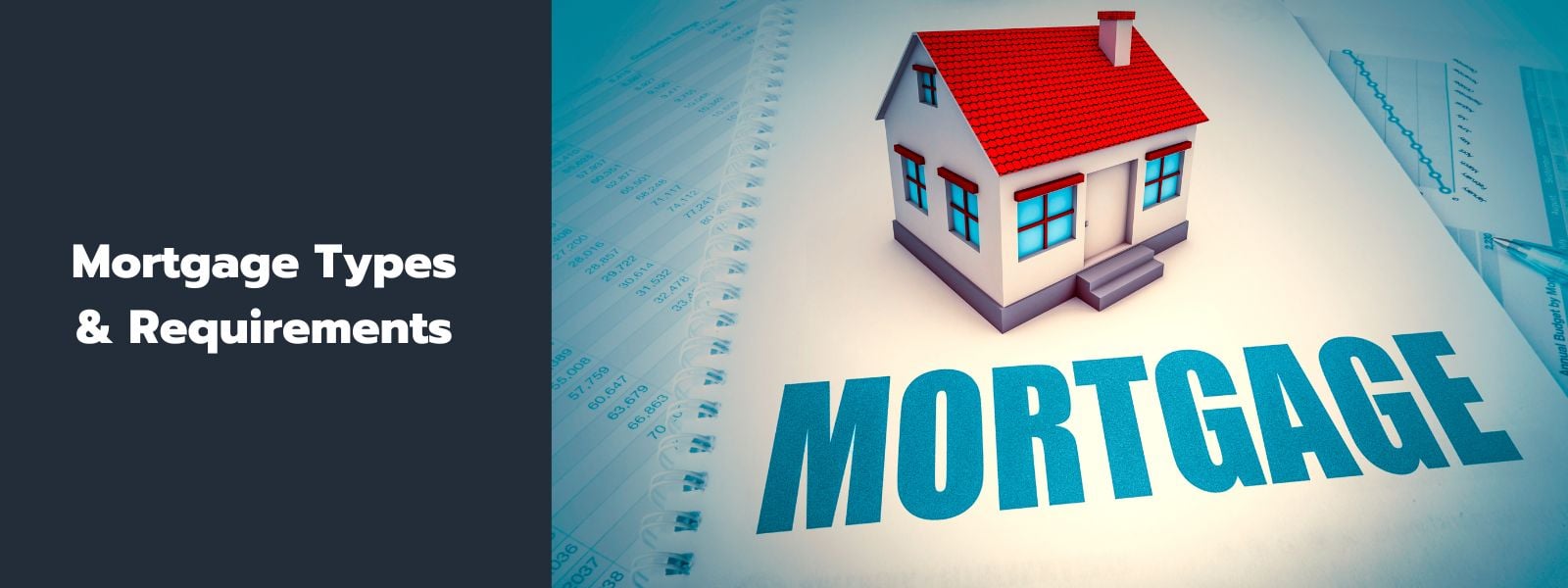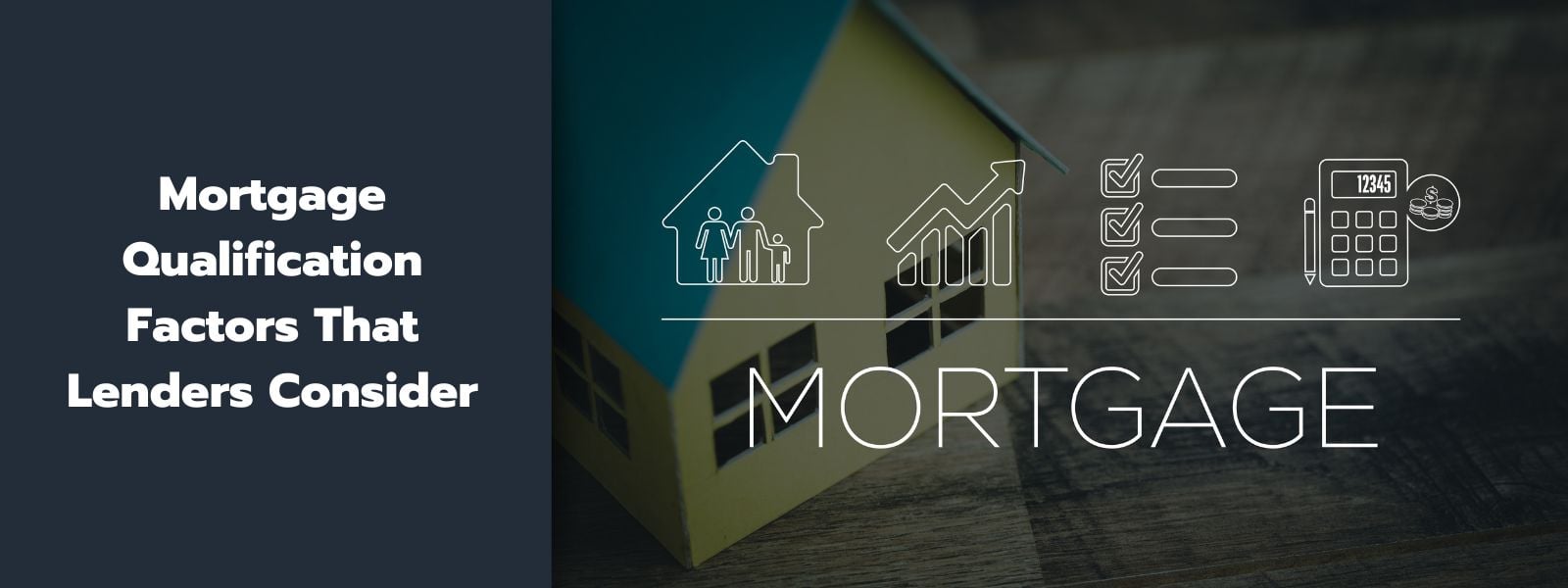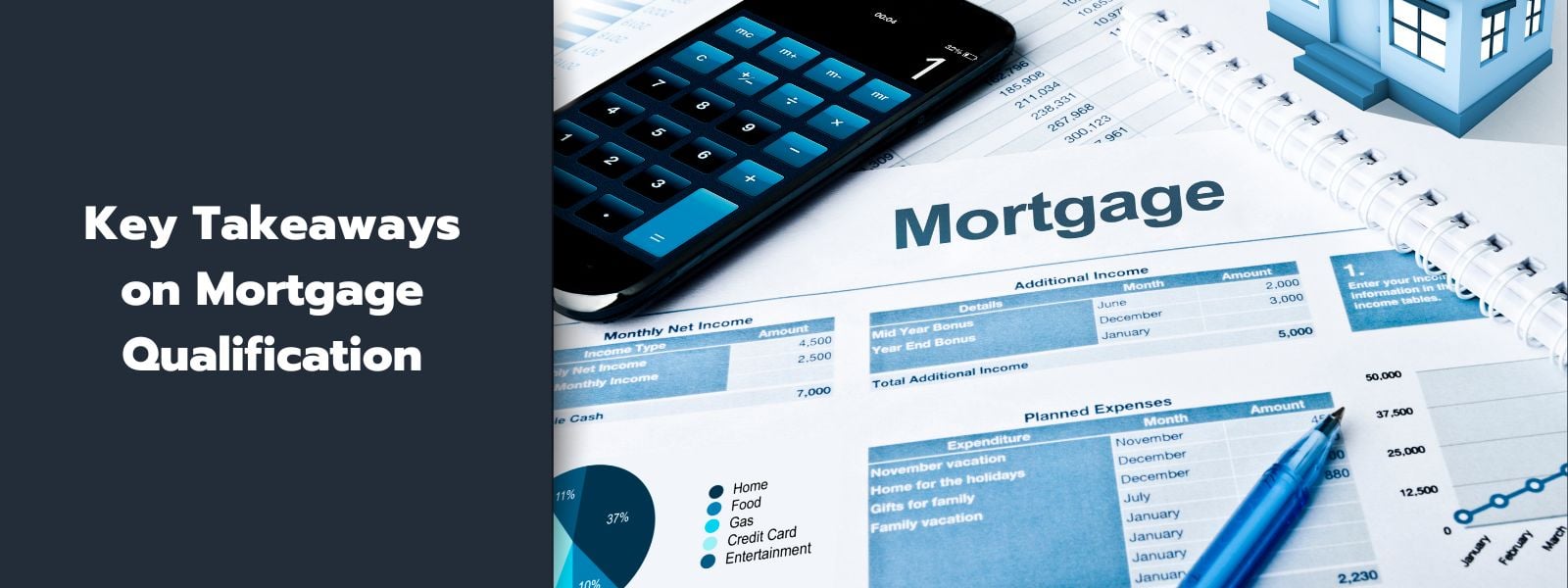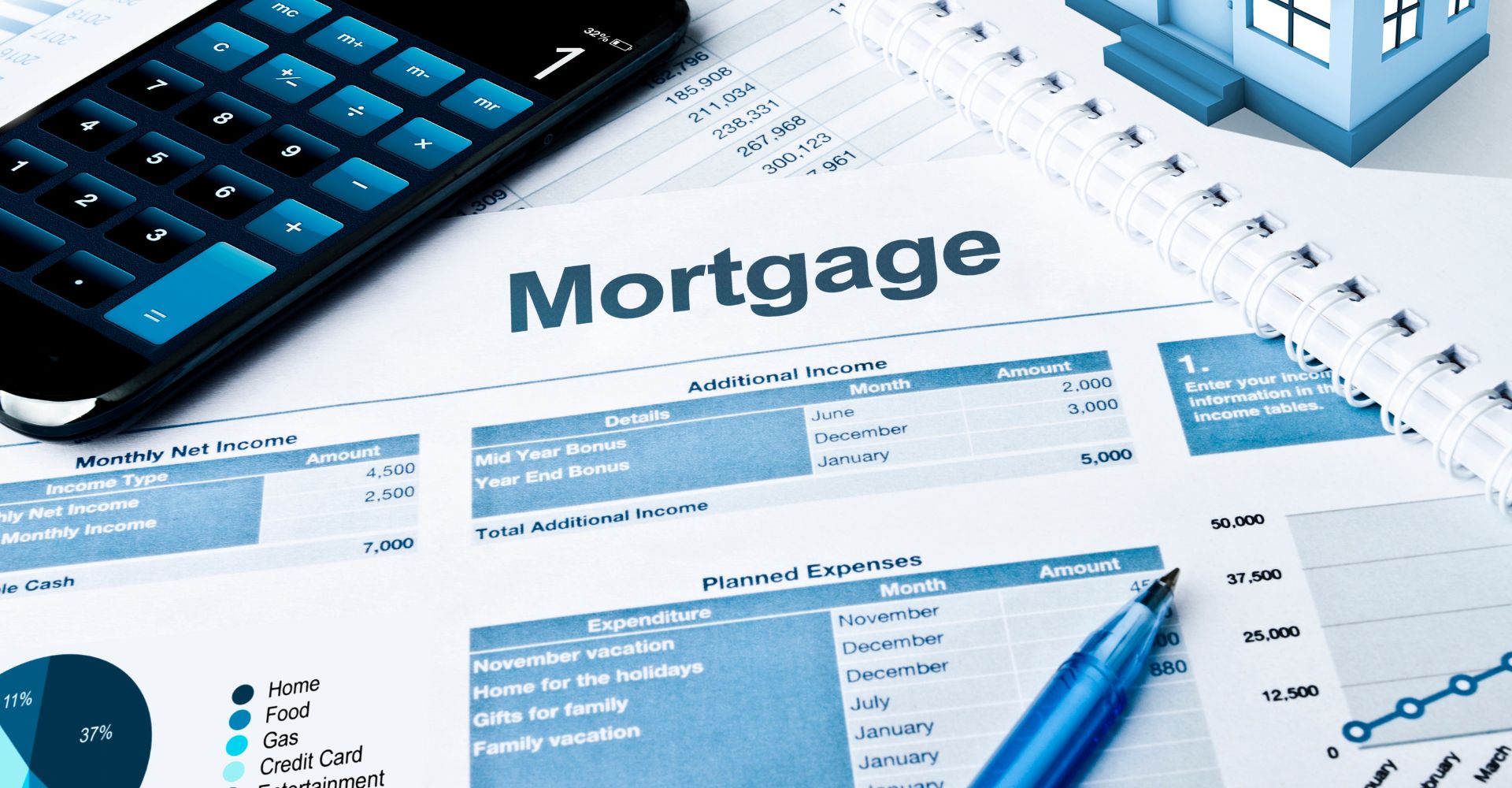Are you prepared to take the leap from being a renter to becoming a homeowner?
Transitioning from renting a home or an apartment to owning a home is a significant step, and it all starts with the process of applying for a mortgage.
However, it’s natural to wonder if you’ll qualify for a mortgage and what factors lenders consider when reviewing applications.
This article aims to provide you with valuable insights into the aspects that lenders analyze when assessing mortgage applications.
Additionally, we’ll explore the different types of mortgages and the requirements to qualify for each.
Let’s dive in and explore mortgage qualifications and how you can qualify for a home loan.

Mortgage Types & Requirements
The type of mortgage you may want to seek as a primary homeowner will depend on your credit scores, income, the lender’s loan menu, and more. Government-backed mortgages (FHA, VA, and USDA loans) are acquired through approved lenders, and conventional home loans are issued by a bank, credit union, or other private lender.
Below, we’ll delve into the most common types of home loans and the requirements needed for mortgage qualification.
Conventional Mortgage Requirements
Among the various types of mortgage loans, conventional loans are the most commonly used. Almost any lender can provide these loans. Conventional loans can be used to purchase a primary residence, secondary residence, or an investment property.
To qualify for a conventional mortgage, you need to meet the following minimum requirements:
- Down payment: With a conventional mortgage, the minimum down payment is 3%. If you are purchasing a single-family home that will be your primary residence, you can use gift funds or a grant as your down payment without any minimum borrower contribution.
- Credit score: If you plan to put less than 25% down, a credit score of at least 660 is typically required. However, if you can afford to pay 25% or more as a down payment, a credit score of 620 or higher may suffice. In case you don’t possess a credit score, you may still be eligible for a loan by demonstrating a reliable payment history for at least two other types of expenses, such as rent, car insurance, or utilities.
- Debt-to-income ratio: While it’s possible to qualify for a home loan with a debt-to-income (DTI) ratio as high as 45%, Freddie Mac recommends that borrowers’ DTI does not exceed 36%.
- Mortgage insurance: Lenders generally require borrowers who put down less than 20% to purchase private mortgage insurance (PMI). However, an alternative option is obtaining an 80-10-10 loan, where you make a 10% down payment, secure a first mortgage covering 80%, and obtain a second mortgage to cover the remaining 10%.
You should choose a conventional mortgage if:
- You have at least a 620 credit score
- You can make a down payment between 3% and 20%
- You want a loan with mortgage insurance that you can get rid of as you build equity
FHA Mortgage Requirements
Loans insured by the Federal Housing Administration (FHA) assist homebuyers who have lower credit scores, lower incomes, or higher debt in purchasing homes. FHA loans are often used when the borrower is ineligible for a conventional home loan. You can use an FHA loan to purchase your primary residence.
To qualify for an FHA mortgage, you need to meet the following minimum requirements:
- Down payment: If your credit score is at least 580, you can make a down payment of 3.5% on an FHA loan.
- Credit score: With a credit score as low as 500, you can still be eligible for an FHA loan, but a 10% down payment is required.
- Debt-to-income ratio (DTI): The maximum DTI for most borrowers is 43%. However, if you have a credit score of 580 or higher and cash reserves, you can have a debt-to-income ratio as high as 50%.
- Mortgage insurance: Every borrower must pay an upfront mortgage insurance premium of 1.75% of the loan amount. This payment can be made in cash at closing or rolled into the loan. Additionally, monthly mortgage insurance premiums are required. The amount and duration of these premiums depend on your down payment and loan term. For example, if you put down less than 5%, the annual premium is 0.85% of the borrowed amount, and you must continue paying these premiums for the entire duration of the loan.
You should choose an FHA mortgage if:
- You have credit scores between 500 and 619
- You have at least a 3.5% down payment and a 580 credit score
- You want to buy a two- to four-unit home with a 3.5% down payment
USDA Mortgage Requirements
The USDA Single Family Housing Guaranteed Loan Program (a.k.a. Section 502 Program), is a government-funded loan program. It was designed to help approved lenders provide low- and moderate-income households with the opportunity to own and finance adequate, modest, and energy-efficient homes in rural areas. These loans are designed for borrowers who are unable to obtain a home loan from other sources. USDA loans can be used to purchase your primary residence.
To qualify for a USDA mortgage, the following are the minimum requirements:
- Down payment: There is no need for a down payment when buying an existing home. However, new construction homes may require a 10% down payment. If you have more than $15,000 in non-retirement savings, you will need to contribute towards the loan.
- Credit score: Borrowers without a credit score can still qualify by using nontraditional credit. If your credit score is below 640, lenders will carefully review your credit report to check for any late payments or other signs of risk.
- Debt-to-income ratio (DTI): The USDA defines your “total debt” or TD, which should not exceed 41% of your income unless you have “compensating factors,” such as a consistent history of meeting higher monthly obligations.
- Mortgage insurance: USDA loans include a 1% loan guarantee fee. This fee can either be paid by the lender or passed on to the borrower. It can be paid during the closing or rolled into the loan. Additionally, these loans have an annual fee of 0.35% based on the loan amount.
You should choose a USDA mortgage if:
- You have a low to moderate income
- You’re buying in a USDA-designated rural neighborhood
- You don’t have the money for a down payment
VA Mortgage Requirements
Military service members, veterans, and surviving spouses may be eligible to obtain a mortgage guaranteed by the Veterans Administration (VA). It is generally easier to qualify for compared to other types of mortgages. VA loans can by used to purchase your primary residence.
To qualify for a VA mortgage, you need to meet the following minimum requirements:
- Down payment: With a VA loan, you can obtain financing without having to make any down payment. Additionally, there is no requirement for cash reserves.
- Credit score: If you do not have a credit score, you can still be approved for a VA loan by using alternative or nontraditional credit sources.
- Debt-to-income ratio: VA lenders typically consider a borrower’s debt-to-income ratio (DTI) with a maximum threshold of 41%. However, if you have other favorable borrower characteristics, such as excellent credit, significant cash reserves, or satisfactory homeownership experience, you may still qualify even with a higher DTI.
- Mortgage insurance: Unlike mortgages with low down payments, VA loans do not require borrowers to make monthly mortgage insurance payments. Instead, there is a funding fee of 2.3% for first-time VA military borrowers who do not make a down payment. This fee can either be paid in cash at closing or rolled into the loan.
You should choose a VA mortgage if:
- You’re an eligible military borrower
- You can’t or don’t want to make a down payment
- You want to avoid mortgage insurance
Jumbo Mortgage Requirements
If you want to borrow more than $766,550 to purchase a single-family home in 2024, you will likely need to obtain a jumbo loan in most parts of the country. However, in high-cost areas, you may be able to borrow up to $765,600 before requiring a jumbo loan. Jumbo loans can be used to purchase your primary residence, secondary residence, vacation homes, and investment properties.
To qualify for a jumbo mortgage, you need to meet the following minimum requirements:
- Down payment: Typically, you will need to provide a down payment of 10% to 20% for a jumbo loan. However, some lenders may accept a down payment of 5% for smaller jumbo loans. Since jumbo loans carry higher risk for lenders, they prefer borrowers to invest more of their own funds upfront. Additionally, you may be required to have cash reserves equivalent to 12 to 18 months after the loan is closed.
- Credit score: Your credit score should be at least 680 for smaller jumbo loans and a minimum of 720 for larger jumbo loans.
- Debt-to-income ratio (DTI): Jumbo loans typically require a DTI ratio not exceeding 40%. However, there’s one major jumbo lender that allows a DTI ratio as high as 42%.
- Mortgage insurance: If your down payment is less than 20% on a jumbo loan, lenders will likely require you to pay for private mortgage insurance (PMI). Alternatively, you may have the option to secure subordinate financing through a second loan, which can eliminate the need for PMI.
You should choose a Jumbo mortgage if:
- You want to borrow more than $766,550 (as of 2024)
- Credit score that’s at least 680
- You have 12 to 18 months of cash reserves

Mortgage Qualification Factors That Lenders Consider
1. Income
Technically, there is no specific minimum income required for a mortgage application. However, your income does play a role in determining the maximum amount you can qualify for. Lenders also prefer to see a stable income history, typically reviewing an applicant’s employment records from the past two years. This means you will need to provide documents such as pay stubs, W-2s or 1099s, and tax returns.
Various types of income are considered for a mortgage application, including overtime pay, commissions, bonuses, dividends, Social Security benefits, alimony, and child support. In some cases, lenders may request supporting documentation, such as a letter from your employer, to confirm that this income is expected to continue for the next few years.
It’s important for self-employed individuals looking to purchase a home to be aware that lenders calculate income after deductions. While it’s understandable to claim deductions, remember that excessive deductions can reduce the loan amount for which you qualify.
Certain types of loans may have upper-income limits, although conventional, FHA, and VA loans typically do not impose such limits. However, USDA loans require that your income does not exceed 115% of the median income in your particular area.
Additional Resources:
- Home Buying Budget: How Much House Can I Afford?
- Real Estate Investing: A Complete Guide to Get Started
- 15-Year vs. 30-Year Mortgages: Which is Right for You?
2. Credit Score
Your credit score is a three-digit number that shows how reliable you are as a borrower. A high credit score means you pay your bills on time, don’t accumulate too much debt, and are careful with your spending. On the other hand, a low credit score could indicate that you often miss payments or tend to take on more debt each month than you can handle. If you have a high credit score, you’ll have access to a wide range of loan options and the lowest interest rates when buying a home.
To qualify for most loans, you typically need a FICO® Score of at least 620. However, if your score falls below 620, you should consider applying for a Federal Housing Administration (FHA) loan or a Department of Veterans Affairs (VA) loan.
An FHA loan is backed by the government and has lower requirements for debt, income, and credit. If your score is as low as 500, you might still be eligible for an FHA loan if you can provide a down payment of at least 10% at your closing meeting.
If you are a qualified active-duty service member, member of the National Guard, reservist, or veteran, you may be eligible for a VA Loan. These loans are also backed by the government and require a minimum FICO® Score of 580 or higher.
The FICO® Score range of 300 to 850 is categorized like this:
- Exceptional: 800 to 850
- Very Good: 740 to 799
- Good: 670 to 739
- Fair: 580 to 669
- Poor: 300 to 579
3. Debt-to-Income Ratio
Mortgage lenders want to ensure that homeowners have sufficient income to cover all their expenses. Simply assessing your income may not provide a complete picture, which is why lenders place greater emphasis on your debt-to-income ratio (DTI). The DTI ratio, expressed as a percentage, indicates to lenders the portion of your gross monthly income that is allocated towards necessary bills.
Calculating your DTI ratio is quite simple. Start by adding up all your fixed monthly payments, excluding any variable expenses. When applying for a mortgage, the debt considered may include rent, credit card minimums, and student loan payments.
Here’s how DTI is calculated:
(Total monthly debt) ÷ (Gross monthly income) x 100 = DTI
There are two types of DTI that mortgage lenders typically use:
- Front-end ratio: Your proposed monthly housing payment as a percentage of your monthly income. The maximum front-end DTI will be about 10 to 12 percentage points lower, or 31% to 36%.
- Back-end ratio: Your current monthly debt payments plus your proposed monthly housing payment as a percentage of your monthly income. The maximum back-end DTI depends on the loan type, credit score, and other factors like documented cash reserves, and is usually 41% to 50%.
4. Assets
Lenders will be interested in learning about the valuable possessions you possess. The purpose behind this is to ensure that these possessions have the potential to be transformed into monetary funds if you encounter any financial difficulties in the future.
These possessions can encompass a wide range of items, such as cash accounts, retirement accounts, stocks and bonds, vehicles, boats, RVs, jewelry, artwork, and collectibles. To establish your ownership and the worth of these possessions, you will be requested to provide evidence, such as appraisal letters. It is crucial for lenders to have this information to accurately assess your financial stability and determine the level of risk involved in lending to you.
5. Documentation
Not having the proper documentation in the mortgage loan process can hold things up. As noted above, lenders usually ask for:
- Tax returns from the past two years
- Two years’ worth of W-2s or year-end pay stubs. If you are self-employed, other evidence of income
- Child support or divorce documents
- Bank statements
- Statements from additional assets
- Gift letters
- Photo ID
- Rental history and contact information
Additional Resources:
- Mortgage Loan Process: A Step-by-Step Guide to Home Loans
- Mortgage Underwriting Process: A Complete Step-by-Step Guide
- 13 Mortgage Shopping Mistakes to Avoid When Buying a Home
6. Property Type & Purpose
So far, we’ve talked about the factors that determine whether someone can qualify for a mortgage, based on their financial history. However, lenders also take into account the purpose of the property you want to buy.
For example, a “primary residence” is a home that you intend to live in. You can usually get a lower interest rate and better terms compared to if you were buying a vacation home or investment property.
The type of home you choose also affects the conditions. Single-family houses generally come with the best rates. On the other hand, there are some other types of housing that may have additional fees. These include condos, co-ops, manufactured houses, log homes, mixed-use developments, and nontraditional architecture. Homes that are shaped like dinosaurs or flying saucers might make lenders a little uneasy.
7. Down Payment
If your down payment is less than 20%, you may need to pay for mortgage insurance. This is a compromise many borrowers make to be able to purchase a home sooner. The amount you pay for mortgage insurance increases as your down payment gets smaller and your credit score gets lower.
Choosing to make a larger down payment could result in a smaller emergency fund. Even if your loan doesn’t mandate cash reserves after closing, it’s advisable to have a substantial emergency fund. This will help cover unexpected home repairs and ensure you don’t risk losing your home if you experience a job loss.
Additional Resources:
- Real Estate Closing Process in Texas: The Most Complete Guide
- Closing Costs: What They Are & How Much You’ll Pay in Texas
- Buyer Closing Timeline: How Long Does it Take to Close on a House?

Key Takeaways on Mortgage Qualification
Qualifying for a mortgage requires various aspects to be considered.
Lenders will assess your income, assets, credit score, debt-to-income ratio, and other qualifications.
However, once you have organized your finances and prepared the required documents, you will be one step closer to achieving homeownership.
If you’re ready to get started, you should begin by finding a real estate agent that you can trust!
Helen Painter Group Realtors is here to offer our real estate expertise and local knowledge.
A long-standing and trusted Fort Worth real estate agency, we’ve been serving buyers and sellers since 1958.
With over six decades of success behind us, you’ll surely have peace of mind knowing your best interests are being represented each step toward buying or selling a home.
To learn more or speak with an agent, feel free to give us a call at (817) 923-7321 or contact us.

